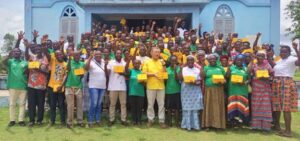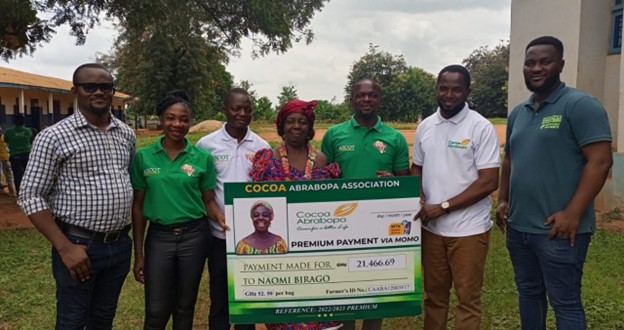Cocoa Abrabopa Association (CAA), a farmer-based organisation, has paid GH¢9.2million in premiums to their farmers across the country.
The cash premium – also known as the ‘sustainability differential’ – forms part of activities under the Rainforest Alliance Certification Programme.
The sustainability differential is additional mandatory cash earned by farmers on their produce for the 2022/2023 crop season, aimed at motivating them to comply with sustainable farming practices and improve their living conditions.
In all, about 8,000 cocoa farmers from CAA’s 39 cocoa operational areas benefitted from the programme. Each farmer was paid an additional GH¢52.50 per bag of certified cocoa sold to CAA.
Mode of payment
All the beneficiary farmers were paid via mobile money and did not have to travel to the Association’s office in Kumasi.
As part of efforts to promote sustainable agriculture in all its operational areas, Abrabopa deployed several initiatives to help farmers increase their yields, promote environmental sustainability, as well as help get rid of child labour and other negative farming practices as part of the company’s corporate social responsibility to the sector.
Success
Addressing a durbar of stakeholders at Anyinam in the Eastern Region, the Regional Manager for CAA, Ebenezer Agbozo, said the sustainability programme has since its inception supported several developmental projects in the areas of education, water and sanitation in the 39 cocoa operational areas across the country’s cocoa regions.
“We at Abrabopa have also embarked on other sustainability programmes: such as afforestation, accessible soil and sustainable environment projects, child labour monitoring projects and living income projects. And, women’s participation in our programmes in the Eastern Region has also grown by about 30 percent in the last three years, an increase we see as encouraging,” he said.
The Council Chairman for CAA, Ismaila Pomasi, said Abrabopa in collaboration with its partners invested millions of cedis into sustainability programmes through the provision of infrastructural facilities and cash premiums.
“The durbar’s significance is to provide a platform for farmers, the council and management to fraternise and share ideas on the strategic policies and programmes outlined to propel the Association’s growth and development.
“I believe that sustainable agriculture and a targetted set of alternative livelihood innovations – like the additional livelihood initiative we have introduced – will help the farmers produce better cocoa, adapt to climate change and increase their productivity,” he said.

The Acting Executive Secretary and Chief Finance and Operations Manager for CAA, Patrick John Van Brakel, said this year’s durbars also served as opportunities for members to verify the total volume of certified beans delivered to the Association and to sign their premium letters thereof.
“The signing of premium letters helps management pay premiums to farmers electronically and on time.
“We need good quality cocoa beans this year, and our target is 16,000 tonnes for the 23/24 crop season. Every one of you must work hard for us to achieve this together, and also remember to record every delivery in your passbook,” he said.
Motivation
For his part, Operations Manager-CAA, Roland Obosu, asked farmers to let the increase in premium payment motivate them to produce quality cocoa that will meet the standards, help increase local sourcing and contribute to the local economy.
“The increase in premium payment for you, our farmers, is part of the Association’s commitment to developing thriving and resilient communities within our 39 operational areas,” he said.
Appreciation
The farmers were grateful to Abrabopa for the massive improvements it has made in their lives and work, and assured of their commitment to the Association.
They appealed for the Association to engage Ghana Cocoa Board (COCOBOD) to find a solution manage illegal mining – popularly known as ‘galamsey’, which they said is posing a threat to their livelihoods.
“As farmers, our livelihoods depend on the land; and we are urging you to discuss with COCOBOD immediately how galamsey is destroying our future,” said Joseph K. Bosompem, who owns about 15 acres of cocoa farm.
“I fear that some farmers may accept such juicy offers, and this will not bode well for the industry,” he pleaded.










